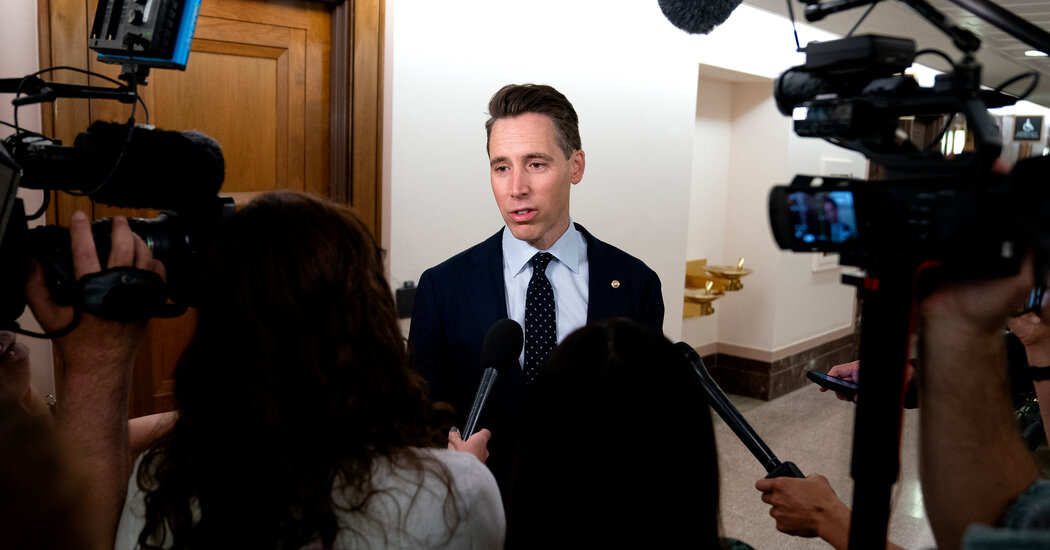
WASHINGTON — When it comes to reining in presidential war powers, Senator Josh Hawley of Missouri, regarded as a leading prospect for the 2024 Republican nomination, agrees with President Biden.
Mr. Hawley supports repealing a decades-old law authorizing the use of military force in Iraq, which has been invoked as part of the legal justification for other military strikes since then and have become the initial focus of a broader effort to re-examine how much leeway Congress should give presidents to wage war.
“It’s time to kill this,” Mr. Hawley said of the law passed in 2002 to authorize the invasion of Iraq under President George W. Bush.
The senator, who has styled himself as former President Donald J. Trump’s populist heir, said it was a matter of listening to his party’s voters, who he said want “to get out” of the nation’s wars.
His stance reflects a tentative but notable shift underway among Republicans as the United States haltingly disengages from what critics call the “forever wars” in Afghanistan and Iraq and continues to debate how to battle terrorist groups in the Middle East and Africa.
After espousing hawkish, interventionist positions for decades and almost uniformly backing the wars in Afghanistan and Iraq, the Republican Party is now grappling with political pressure to align itself more closely with the inward-looking “America First” foreign policy articulated by Mr. Trump and backed by many conservative voters. It parallels similar foreign policy shifts Republicans have made in recent years to hew closer to Mr. Trump’s views, including a move away from their support of free trade and a growing appetite for aggressive federal intervention to bolster American competitiveness against China.
Many Republicans remain opposed to repealing the Iraq-related authorization. And they have shown little enthusiasm for getting rid of the much broader war authorization passed by Congress after the Sept. 11 attacks, which has been used by successive administrations of both parties as the main legal basis for a wide range of military actions.
Still, the shifting politics of the issue have helped to fuel the first significant bipartisan effort in a generation to curb a president’s authority to take military action.
Legislation taking shape in the Senate to repeal both a 1991 authorization for the Persian Gulf War and the 2002 law, an effort blessed by Mr. Biden, is partly symbolic, given that the government says it is not relying on either of them. But it reflects a growing consensus in favor of reasserting Congress’s influence over matters of war and peace, driven at least in part by the changing Republican political calculus.
The House, with support from dozens of Republicans, passed two bills in June repealing the Iraq measures, and on Wednesday, as a Senate committee approved legislation to repeal both, Senator Chuck Schumer, Democrat of New York and the majority leader, confirmed that he would bring it up this year. The debate would be the first time in years for lawmakers to weigh in on an attempt to claw back presidential war-making powers that could actually be signed into law.
It could also fuel further discussion about the more consequential question of what to do about the post-9/11 authorization, which Republican and Democratic presidents have repeatedly invoked over decades — many lawmakers argue far beyond the bounds initially intended — as the legal backbone for American military force around the world. The Biden administration has said it is open to tightening that law, but there is little consensus in Congress about how to do so.
The issue of presidential war powers has long divided both parties, stoking a mostly theoretical debate. But the dilemma this year is particularly acute for Republicans, for whom it has become the latest in a series of proxy battles over Mr. Trump’s hold on the party, pitting those who want to follow the former president’s lead in extricating the United States from conflicts in the Middle East against those who hew to longstanding party orthodoxy in favor of a muscular military posture.
“If they lean hard against” policies of restraint, “then they’re running into the teeth” of Mr. Trump’s language “that helped educate the Republican base for four years about ending endless war,” said William P. Ruger, who was Mr. Trump’s nominee for ambassador to Afghanistan and is the vice president for foreign policy at Stand Together, backed by the libertarian-leaning billionaire Charles Koch. “The politics have shifted on this.”
It has led to a difficult balancing act for Republicans, some of whom have sought to find a position that would avoid alienating either wing of their party.
“I am a firm believer in Congress exercising its constitutional authority over war-making powers,” Senator Ted Cruz, Republican of Texas, said in a recent interview. But Mr. Cruz said he would be willing to repeal the Iraq authorization only if Congress granted the president new powers.
“If we clarify that there is ample authority to defend this nation from threats from Iran, then I’d be willing to support it,” he said.
His proposal to do so failed in the Senate Armed Services Committee on Wednesday, and Mr. Cruz voted against the repeal. Three Republicans joined Democrats in supporting it.
Senator Tom Cotton of Arkansas has also walked a careful line on the issue. Mr. Cotton, a retired Army captain who served tours in Iraq and Afghanistan and is widely considered to be mulling a presidential run in 2024, for years established himself as one of Washington’s staunchest foreign policy hawks.
But when Mr. Biden announced in April that he would withdraw troops from Afghanistan, Mr. Cotton was largely silent. A pair of local television outlets reported that he was “cautiously optimistic” about the withdrawal, and in interviews, he conspicuously did not criticize the decision.
“We were never trying to make Afghanistan into a Western-style democracy like Switzerland,” Mr. Cotton said. “We were there to protect the United States from getting attacked again the way we were on 9/11.”
A spokeswoman for Mr. Cotton did not respond to requests asking for his view on repealing the 2002 authorization. Asked to comment on the effort in a June interview on Fox, Mr. Cotton brushed off the question, saying it didn’t matter “all that much” because of the president’s inherent war-making powers, but that its consideration was an example of Democrats’ “misplaced priorities.”
The shift was notable to Bill Kristol, a neoconservative writer and leading critic of Mr. Trump who championed the war in Afghanistan.
Elected Republicans “seem to have gotten more silent, which does tell me that ‘America First’ attitude remains pretty strong in the party and people don’t want to get crosswise of that,” Mr. Kristol said in an interview.
Mr. Hawley said the sentiments of Republican voters are driving the trend.
“Their view is there’s not a lot of strategic clarity — what are we doing there?” he said. “The former president reflected the voters on this. He articulated that position, but there was a reason for that: That’s where voters in the party are.”
Senator Mitch McConnell, Republican of Kentucky and the minority leader, has been one of the most vocal exceptions. During the Trump administration, he repeatedly criticized the president’s attempts to draw down troops from the Middle East, leading the Senate in a vote condemning Mr. Trump’s plan to pare back the U.S. military footprint in Syria and blistering his drive to withdraw from Afghanistan in an unsparing speech from the Senate floor.
More recently, he has condemned efforts to repeal the 2002 authorization of military force, arguing that the practical application of the law “extends far beyond the defeat of Saddam Hussein’s regime” and that getting rid of it would also hamstring counterterrorism efforts in Syria.
“Tossing it aside without answering real questions about our ongoing efforts in the region is reckless,” Mr. McConnell said.
Allied with him was Senator Marco Rubio of Florida, who said in a brief interview that he was not inclined to support the repeal and sketched out a broad interpretation of presidential war-making authority.
“What I don’t want is someone coming back later and saying we can’t go after some militia group, we can’t go after Al Qaeda,” Mr. Rubio said.
Mr. Rubio said he feared a situation in which lawmakers could block a president from using his inherent military powers for an extended period of time without getting congressional approval.
“In many cases,” he said, “our adversaries would use that to their advantage.”
Emily Cochrane contributed reporting.




